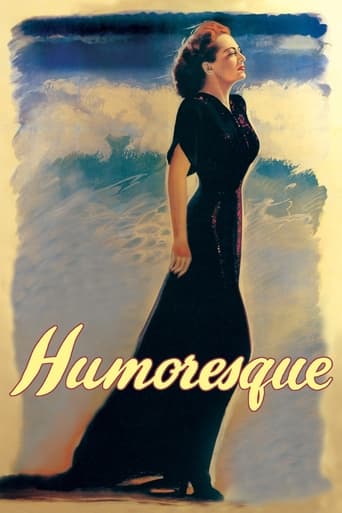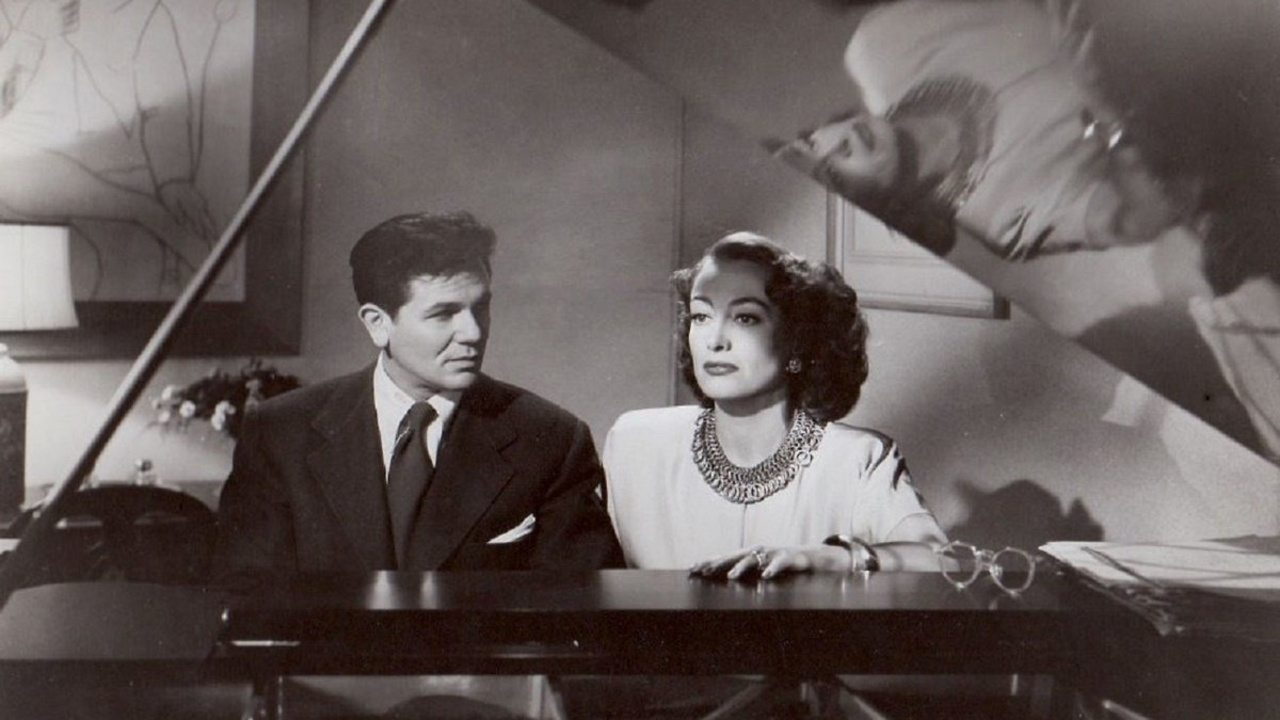JohnHowardReid
NOTES: Although he received a single-frame billing for "conducting", Franz Waxman was nominated for an Academy Award for Best Scoring of a Drama or Comedy, losing to Hugo Friedhofer's The Best Years of Our Lives. Domestic rentals gross: $2.6 million which made it Warner's second biggest attraction (Life With Father was first) of the 1946-47 season.Over 20 classical compositions are heard in the movie, including Dvorak's "Humoresque", Wagner's "Tristan and Isolde" and works by Richard Strauss, Paganini, Mendelssohn, Beethoven, Gershwin, Stravinsky. Isaac Stern dubs for Garfield on the violin, Levant does his own piano playing, while Waxman conducts an augmented to 115-piece studio orchestra. In addition, Peg La Centra sings three tunes: "I Guess I'll Have To Change My Plan", "You Do Something To Me" and "What Is This Thing Called Love?"COMMENT: A musical feast with marvelous production values, an incisive script and fine performances, this re-make of a 1920 silent picture (directed by Frank Borzage from a script by Frances Marion, starring Alma Rubens) is given an all-stops-out sound treatment here. The breathtaking music ranges from a violin transcription of Bizet's Carmen Suite to a generous excerpt from Lalo's Symphonie Espagnole for Violin and Orchestra. Brilliantly performed.Although Crawford doesn't come on for nearly an hour, she really so excels in her playing here that she fully deserves her top billing over Garfield's forceful violinist. She uses her face and eyes most expressively and gives Odets and Gold's dialogue that extra edge that makes it seem sharper, more honed and yet more realistic than it actually is. I thought her playing here even more dynamic than her Mildred Pierce for which she won her only Academy Award - yet this time she wasn't even nominated. Garfield is perfect too, whilst Levant contributes his usual delightfully caustic self-impersonation. So many players provide such solid support, it seems niggardly to mention only Joan Chandler, Ruth Nelson, Tom D'Andrea and Paul Cavanagh.Negulesco has directed in fine style. This is a world he obviously knows well, his keen eye driving home both the miniature details and the broad canvas of this masterfully emotional re-working of Golden Boy.OTHER VIEWS: One of the worst decisions I ever made was letting Joan Crawford go. Mildred Pierce, Humoresque and Possessed were the sort of pictures she should have been given at M-G-M. Academy Award timber, all of them. - Louis B. Mayer.
vincentlynch-moonoi
SPOILER ALERT:The first problem with this film is that none of the major characters are likable. Joan Crawford plays a self-obsessed, half-drunk socialite who ruins the lives of every husband she has had, and while wallowing in self-pity intends to ruin the life of our other main character -- John Garfield. Garfield plays a violinist who is rude to just about everyone -- because he's an artist -- including his mother and the woman who really loves him. About an hour into the film you're wishing the father had gotten his way and the young Garfield had been forced to take the fire engine (you'll understand if you choose to suffer through this film). The third major character is Oscar Levant, a pianist whose sole purpose in the film seems to be to make wisecracks which often seem out of place. I know, he was the accompanist, but that role could have been played by a bit player. The only acting I enjoyed in the film was by supporting characters -- J. Carrol Naish as Garfield's father, Ruth Nelson as Garfield's mother, and Paul Cavanagh as Crawford's husband.I will give Garfield credit for making his violin playing quite convincing, although closeups of the hands playing the violin were actually the hands of Issac Stern. Nevertheless, Garfield did a nice job here. Also, there's some great music here! By the time we reach the movie's climax, I began wishing that Crawford's character would commit suicide and put us all out of our misery. Take pills with all that alcohol. Slit your wrists on that broken glass. Walk into the waves. I didn't see it coming...but she did! If only she had done it 2 hours earlier.I know some people think this was a wonderful film, but I think it was a dog. The best thing about the film -- Crawford in the movie poster. Early in the film when his brother was complaining about Garfield making no money for the family, I was afraid Garfield was going to become a gangster. Two hours later I wished he had.
evening1
I got about half-way through this when I threw in the towel. I am eager to read other reviews to try to grasp why this melodrama is rated so highly.I just felt like Joan Crawford, as the ice-queen socialite Helen Wright, whose very name is a cliché, was phoning in her lines. I didn't like her hair, her face, or her demeanor, and all those things wore away at my interest.Oscar Levant, who does not seem to age a day from the time when Paul Boray (John Garfield) is a boy in short pants to when he's a professional violinist, grates badly as a wisecracking pianist. After a while you wish he'd restrict his communication to tickling the ivories.Of the leads, Garfield is best here but his contribution couldn't salvage this for me.To its credit, this film features some wonderful orchestral and solo musical performances. And a 13-year-old Robert Blake is excellent playing Paul as a boy.
brendangcarroll
In the mid 1940s, Hollywood suddenly got the classical music bug and a whole string of lush melodramas were made, among them Columbia's 'A Song to Remember' (a risible biopic of Chopin with Cornel Wilde and Merle Oberon that, in one famous scene, gave Liberace his entire act), MGM's 'Song of Love' (a biopic of Schumann with Robert Walker and Katherine Hepburn) and 'Carnegie Hall' (a film about the famous hall with a dumb plot, stuffed with cameos from the musical greats of the day which is its chief value now).The two best films of the cycle however,'Deception' and 'Humoresque' were made at Warner Brothers, almost simultaneously, and starring those arch rivals Bette Davis and Joan Crawford respectively. Warners had by far the best and most interesting music department in Hollywood then, with (at this time) the three titans of film music working there - Max Steiner, Erich Wolfgang Korngold and Franz Waxman. Max superbly handled the Warner biopics of Gershwin (Rhapsody in Blue 1945) and Cole Porter (Night and Day 1946), Korngold did a superb job on'Deception' and Waxman was in charge for this film.HUMORESQUE is a remarkable example of a film treatment that transcends its material. I won't repeat the many deficiencies in plot and story development that others have noted in their reviews here. They must have been clichéd even in 1946. What makes this film eminently watchable is the wonderful direction and cinematography that richly showcases a New York that no longer exists (and that was recreated in Burbank with aplomb!) and which presents the stars of the film in some of the most erotic and sumptuous photography of the era.Some shots must have taken hours to set up and light properly. Check out the moment at Helen Wright's party early in the film ["She's as complex as a Bach fugue"], where she meets Paul Boray for the first time ("Bad manners Mr Boray: the infallible sign of talent").After he insults her and launches into Rimsky-Korsakov's 'Flight of the Bumble Bee', she walks off in a temper, to the bar, to pour herself yet another brandy and as she holds the large brandy glass in her hand, Ernest Haller somehow allows us to see Boray directly through the glass with both Garfield and the glass in perfect focus. It's an astonishing shot, an obvious visual metaphor to be sure, showing how Mrs Wright wishes to control Boray from now on - but, what a stunning effect! Negulesco is equally inventive and manages some very deft combinations of sound-stage and location footage, especially at Wright's beach house. He also films the musical sequences wonderfully well, ably convincing us that Garfield is really playing, borrowing the trick (from 'Deception' being shot on adjoining stages) of using two real musicians out of camera shot for the fingering and bowing and even Isaac Stern himself for close ups of the left hand.The music is superbly performed and recorded, and the repertoire is well chosen. That applies not only to the classics. Peg La Centra's contribution, singing great standards of the 1930s and early 40s, is so evocative, one really wants to go to Teddy's Bar right away, for a large Martini. I bet he made a good one.The finale of the film borrows from that of 'A Star is Born' but elevates the whole suicide idea to an extravagant degree. According to an interview Negulesco gave late in life (that appears in a book called 'The Celluloid Muse') the idea to use the Liebestod from Wagner's Tristan and Isolde, (transcribed for violin), was actually Oscar Levant's and annoyed Franz Waxman, who had other ideas. In the end, he acquiesced and produced a stunning transcription that works extremely well as a concert work. Stern never commercially recorded it (unlike the Carmen Fantasie, another gem from this score) but his performance on the soundtrack is outstanding. What a pity no original optical track survives in the Warner vaults.With its ripe dialogue, a great supporting cast, some of the most voluptuous photography in any 1940s film and a fabulous musical soundtrack, HUMORESQUE repays repeated viewings and is a classic of its kind.It's the kind of film that could not be made today - but let us be grateful that once upon a time in Hollywood, there was the talent around that could make it, .....and very well indeed.



 AD
AD



